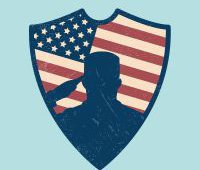Study: light therapy for persistent concussion symptoms
Updated April 29, 2023, by Malayka Gormally.
RESEARCHERS ARE NO LONGER RECRUITING FOR THIS STUDY
Researchers were recruiting for a study investigating if light therapy can improve thinking and memory in people who have suffered at least one mild traumatic brain injury (a concussion) or moderate traumatic brain injury (TBI) at least six months ago. A research team at the Boston VA Research Institute, Inc. and the VA Boston Healthcare System sent a photobiomodulation (light therapy) device to each participant for home-based treatment.
Individuals are not eligible to participate if they have had a severe TBI or have had “a surgical procedure to relieve pressure, or stop bleeding in the head.” The study is fully remote and open to United States citizens. Participants in the Boston area may be recruited for MRI scans for the study.
“The TBI/s may be associated with car accidents, blast injury in veterans, and work-related or sports-related impacts to the head such as may occur in American football, ice hockey, soccer, basketball, etc.” People who have been exposed to repetitive head impacts, such as athletes in contact sports, may also be eligible.
Study participants must be between 18 and 65; the study is open to veterans and the general public. Participants will be compensated for their time; participation in the study is estimated to take four months.
See the recruitment flyer and the one-page study description for more information.
This study is closed: researchers are no longer recruiting
Description of the study
Margaret Naeser, PhD, is located at the Boston VA Medical Center, and is Research Professor of Neurology, Boston University School of Medicine. In this video, she discusses transcranial photobiomodulation (tPBM) as a possible treatment modality to improve cognition after traumatic brain injury (TBI) and in retired professional football players who may be developing chronic traumatic encephalopathy (CTE).
Dr. Paula Martin and her Boston VA Medical Center team are recruiting 20 participants, ages 18-65, for this remote clinical trial.
The team will ship the light therapy equipment to the participants, who will be trained (via phone) on using the flexible, lightweight headframe device with five small LEDs. Participants will use the device three times a week for 20 minutes. Please read our Light Therapy / Photobiomodulation page to learn more about this therapy and the devices used.
Participants will undergo memory and thinking tests and mood and behavior questionnaires. After the follow-up testing is completed, the researchers will explain their results.
Why LED light therapy?
According to principal investigator Dr. Laura Martin’s call for research participants, the rationale for LED therapy is that “after a TBI, some cells in the brain may not fully recover. Applying light to the head may help to repair cells that may not be functioning properly after TBI. The light is painless, and there is no generation of heat.”
For further information, please read our page about light therapy treatment, including details about light therapy devices. To learn more about past light therapy research, refer to our blog post on studies of LED light therapy for persistent post-concussion symptoms. Also, see our post about two case studies of light therapy for retired pro football players suffering from the effects of repetitive head impacts.
The VA has also discussed LED light therapy on its blog, as it is one of the treatments offered to veterans through the Center for Compassionate Care Innovation and the VA Boston Healthcare System, Rehabilitation Medicine Services, LED TBI CLINIC. The mission of the Center for Compassionate Care is “to explore emerging therapies that are safe and ethical to enhance Veteran physical and mental well-being when other treatments have not been successful.”






































In an interview, RJ discusses his potential CTE and his positive experience as a participant in a University of Utah photobiomodulation (light therapy) study. RJ played high school and college football, experiencing repetitive head impacts and multiple concussions.